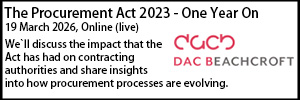Transformation? Or transparency gone too far?
- Details
Kieran McGaughey provides a local authority view on the transparency obligations contained in the procurement Green Paper.
Earlier this month saw the deadline pass for responses to the Cabinet Office’s Green Paper: Transforming Public Procurement. As the initial dust settles, a number of themes have begun to emerge from local authority responses to the consultation. In this article, I will focus on one of those themes – namely, concerns around the proposed new transparency obligations. And, most pertinently, the additional work (and possible litigation) that this might entail….
As you would expect in a consultation relating to public procurement law, transparency is a key concept within the proposed Green Paper reforms. Indeed, there is an entire chapter of the paper devoted to the topic - Chapter 6 “Ensuring open and transparent contracting”. The words “transparent” and “transparency” also appear however right throughout the document (64 times, if you are counting…) And, indeed, if these proposals do go ahead, transparency will need to be embedded right throughout procurement processes – from planning through to performance. Local authorities (and other buyers) would be required then to disclose procurement and contract data “as soon as practically possible”. Some of the specific proposals include:
- publicly naming all the bidders involved in a procurement, along with basic disclosure of their bids
- evaluation reports being published online
- publishing notices when using the new limited tendering procedure
- a published record of performance against KPIs for each contract
- increased requirements for notices of variations to existing contracts
- recording complaints and legal challenges on a new central platform
- publishing procurement pipelines for future requirements
That (long) list is not necessarily exhaustive however (!) The first concern then is around the obvious resource implications for local authorities – this would all involve lots more work. Not only for procurement officers and contract managers, but also us legal advisers too. Much of the above information will need careful scrutiny prior to publication. Particularly so for higher value, more complex procurements where an increased risk of litigation exists. A recent poll of our Lawyers in Local Government (LLG) members revealed that 47% envisaged a "substantial increase" in work for their legal teams arising from the Green Paper reforms. An additional 37% envisaged a "slight increase".
Transparency is, of course, nothing new to local government. Local authority meetings, for example, have been open to the public for decades (the Public Bodies (Admission to Meetings) Act 1960). Further, November past saw the 20th anniversary of the passing of the Freedom of Information Act 2000. Whilst some of you might not have saw fit to celebrate that particular birthday (given the work the Act can entail...), its provisions are now well embedded in the psyche of local authorities. Whilst much of the Freedom of Information Act is largely reactive, there are also other proactive publication requirements upon local authorities. On the topic of procurement, the Local Government Transparency Code 2015 requires publication of tenders/contracts above £5,000 in value. Indeed, The Public Contracts Regulations 2015 themselves also mandate the publication of certain notices and information.
As set out in the above Code from 2015, the transparency agenda reflected the Government’s desire:
“to place more power into citizens’ hands to increase democratic accountability and make it easier for local people to contribute to the local decision making process and help shape public services. Transparency is the foundation of local accountability and the key that gives people the tools and information they need to enable them to play a bigger role in society. The availability of data can also open new markets for local business, the voluntary and community sectors and social enterprises to run services or manage public assets.”
Those of you following the Good Law Project’s recent litigation on government failures to publish procurement notices might raise a chuckle at that one…..
Joking aside, I am sure many local authorities can agree with the government that these are laudable aims. Transparency is not, of itself, the issue however. Rather it is the scope and scale of these proposals that causes unease in town halls (or living rooms…) across the country. In spite of the existing provisions above, the Green Paper still represents a very significant shift in the context of public procurement transparency. Whereas some of the list above might previously have been teased out via a freedom of information request, in future it would need to be proactively published in every case. The resource implications of this should not be understated. They must also be viewed through the prism of the ongoing financial austerity many Councils find themselves in. With the small matter of a global pandemic to contend with, and ten years of severe budget cuts, local authority purse strings are understandably being grasped rather tightly. Anything then which entails more work, and more staff, is understandably a source of concern.
Food for thought?
A further source of local government apprehension is the increased litigation risk. Win or lose, procurement challenges are inherently expensive, resource intensive and time consuming processes. Will more evaluation information being out in the open just lead to more of these challenges? Particularly so when this coincides with the more “accessible” challenge system envisaged by the Paper. Will bidders be happy for low scoring bids and the accompanying feedback to go public? How will they react to poor contractual performance being published online? “The proof will be in the pudding” as many commentators have said. The recent case of Bechtel Limited v High Speed Two (HS2) Limited helpfully affirms that local authorities will not be under a duty of perfection (which is perhaps just as well given the resource issues above….) However, those searching for manifest error and breach will certainly have more to get their teeth into under the new regime.
Lord Agnew confidently stated, in his ministerial forward to the Green Paper, that “the UK is ready" (I'm just glad he didn't say "oven ready" this time...) Many local authorities, it would seem, do not share that confidence. We have shared those concerns with the Cabinet Office in our LLG response to the Green Paper, and hope that these might offer some useful “food for thought”. Whilst the Green Paper proposals undoubtedly have some good ingredients, the transparency provisions above may yet prove to be half-baked…..
Kieran McGaughey is a Commercial Solicitor at Newcastle City Council, and a Director of Lawyers in Local Government (LLG). He is also their National Lead for Partnership & Procurement Law. You can contact Kieran by email at
Sponsored articles
Unlocking legal talent
Walker Morris supports Tower Hamlets Council in first known Remediation Contribution Order application issued by local authority
15-07-2026 11:00 am














































